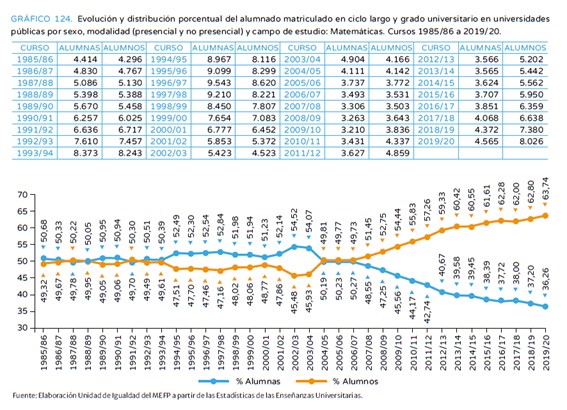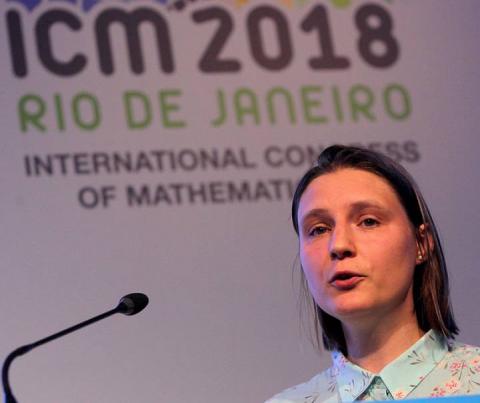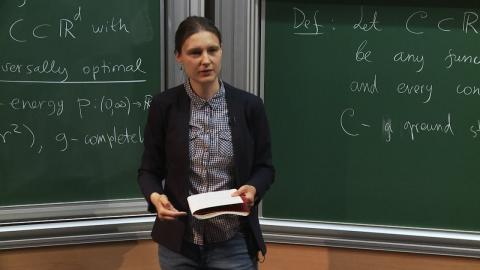A study recently published in La Gaceta de la Real Sociedad Matemática Española indicates that disaffection towards a research career affects women to a greater extent than men.
The conclusions of this analysis are based on the responses to a survey, carried out during the 2021/2022 academic year, of undergraduate Mathematics students at twelve Spanish universities. The data indicate that 26.2 % of the female students surveyed consider it "not at all likely" that they will be involved in research at the end of their degree, compared with 18.6 % of the male students who say the same. At the other extreme, 9.2 % of female students and 11 % of male students say that it is "extremely likely" to pursue a research career after completing their studies.
The same issue of La Gaceta de la Real Sociedad Matemática Española publishes a list of the 152 doctoral theses defended during the year 2022 in 34 Spanish universities: approximately 33 % of the theses were written by women, compared to 67 % of the dissertations presented by men. These data seem to corroborate the greater disaffection of women for research in mathematics.
Let's start at the beginning: the situation in mathematics degrees
Before commenting in more detail on the conclusions of this detailed study, it is useful to know the evolution of enrolments in mathematics degrees in Spain. The following graph, taken from the Ministry of Education and Vocational Training's report Radiography of the gender gap in STEAM education. A detailed study of the educational trajectory of girls and women in Spain, shows the evolution of enrolments in mathematics studies in Spanish public universities from the academic year 1985/86 to 2019/20.
In the 2019/20 academic year, there were 63.74% male students in Mathematics degrees compared to 36.26% female students, at a time when mathematics is in high demand
If we look at the percentage distribution of students enrolled by sex, we can see that, in the first years analysed, the percentages of female and male students are similar. This trend changes from the 2004/05 academic year onwards, when the percentage of male students increases in relation to that of female students, and this trend is consolidated until the 2019/20 academic year, when 63.74% of students are male compared to 36.26% of female students.

These data are disconcerting, especially at a time when a degree in Mathematics is in high demand from organisations and companies linked to the fields of technology, finance and health, among others.
Although the authors of the study in question allude to this trend in their article, they focus on what happens afterwards, once the Mathematics degree has begun. They attempt to investigate the reasons related to the loss of interest (on the part of both women and men) in a research career during university studies, and to understand the causes that lead to the lower probability of women choosing research after completing their degree.
The most relevant findings of the study
The number of years of enrolment in a Mathematics degree is the most important determinant (for both women and men) of disaffection with research. Probably the lack of knowledge of the contents and the way of working during a degree and the lack of information about what it means to dedicate oneself to research disappear as the years go by. The study also confirms that this disaffection is more profound in the case of female students.
Those students (both women and men) with higher grades at the undergraduate level have higher expectations of pursuing a research career. On the other hand, students who combine their degree with a paid job reduce their interest in pursuing research after completing their degree.
A positive self-perception of one's own abilities increases the prospects for a future research career. In self-assessment, men tend to rate themselves higher than women in comparison to their peers
The study incorporates other significant variables to try to understand the differences between women and men in their expectations of pursuing research: the perception of their own abilities and positioning with respect to their peer group, satisfaction with the choice of the degree in Mathematics, and interest in choosing the studies they are studying if they had the possibility of choosing again.
Greater satisfaction with the progress of the degree and a positive self-perception of one's own abilities increase the prospects for a future research career. In the case of self-assessment in relation to their peers, it is observed that men tend to rate themselves higher than their female peers, which would partly explain the greater disaffection with research among female students. These results confirm previous studies which have found that females tend to evaluate their mathematical abilities less highly than males.
The mathematical contributions are (and will continue to be) mostly by men
As discussed in the conclusions of the report, it would be interesting to carry out a more in-depth study of other factors affecting disaffection with mathematics research. Even so, what is clear is that the future of research in mathematics in Spain has a clearly male profile: women choose a degree in mathematics to a lesser extent than men, and those who decide to study this degree declare less interest than men in pursuing research.
In the fight for equality between women and men, mathematics also matters
This year's theme for International Women's Day is For an Inclusive Digital World: Innovation and Technology for Gender Equality.
Research in the field of mathematics is central to any environment linked to innovation and technology. The findings of the above study would indicate that these mathematical contributions are (and will continue to be) overwhelmingly male-authored. And this is very worrying.
Journalist and feminist activist Caroline Criado Pérez alludes in her book The Invisible Woman (awarded by the Financial Times as the "best business book of 2019") to what she defines as the "one-size-fits-all approach to men". This perspective, which lacks information and interest in what happens to and concerns us women, leads, among other things, to technological advances and major political decisions being made to the exclusion of half of the population. If we want to innovate for everyone, there must be more women doing research in all areas of knowledge, particularly in the field of mathematics. We have a lot at stake.

Sobre la autora: Marta Macho Stadler, is a lecturer in the Department of Mathematics at the University of the Basque Country (UPV/EHU).




